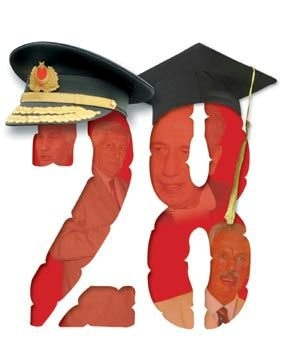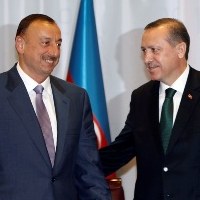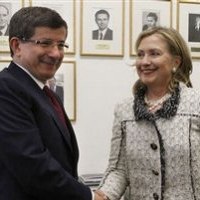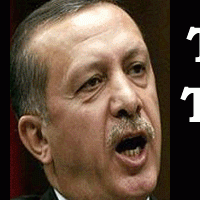![]()
Mon, April 16, 2012 | By Halil M. Karaveli
This article was first published in the Turkey Analyst, vol. 5 no. 8 (www.turkeyanalyst.org), a biweekly publication of the Central Asia-Caucasus Institute & Silk Road Studies Program Joint Center. © Central Asia-Caucasus Institute & Silk Road Studies Program Joint Center, 2012.
The trial of the two surviving members of the junta that seized power on September 12, 1980, in a coup that altered Turkey’s course, is an historic event, but it does not reflect any desire to settle accounts with a regime whose framework, on the contrary, is preserved. What would amount to the ultimate conviction of Kenan Evren would be if the constitution that bears his signature were to be scrapped and replaced with a democratic one. But instead, Prime Minister Recep Tayyip Erdoğan wants to concentrate even more power into his hands than Evren once did.
Background
On April 4, 2012, retired generals Kenan Evren and Tahsin Şahinkaya were put on trial for having overthrown the democratically legitimate government in 1980. Evren was chief of the General staff at the time and was subsequently, in 1982, elevated to the presidency, while Şahinkaya was commander of the air force. The trial of the two last surviving members of the military junta that seized power on September 12, 1980 is an historic event. This is the case not only because this is the first time in Turkey that the perpetrators of a successful coup are being put on trial, but also because the coup was the most devastating of the four coups that the Turkish military has staged, the first in 1960 and the latest in 1997. Its consequences have been exceptionally far-reaching.
Turkey has in fact never recovered from the havoc brought on society and on the body politic by the 1980 coup; although the reign of the military junta nominally only lasted for three years, the generals very much succeeded in engineering a total refashioning of the country according to their authoritarian blueprint. Indeed, Kenan Evren is, in a sense, arguably the “father” of today’s Turkey. Even though Evren, like Şahinkaya, was absent when the trial started (both were excused for health reasons), his legacy informs the present.
650,000 people were arrested during the rule of the Evren junta. 230,000 people were put on trial. Two thousand of those were convicted of the crime of membership in leftist and rightist organizations that had been declared illegal by the junta. Over one hundred death sentences were passed; fifty five of those convicted, of which several were underage, were hanged. Tens of thousands were tortured; in only one prison, the notorious Diyarbakir prison in the Kurdish-dominated southeast where conditions were particularly appalling, thirty-four detainees were tortured to death during the junta’s rule.
Kenan Evren has never expressed any regrets; on the contrary, he has stated that he would not have hesitated to do to same if he had been in a commanding position and if the conditions had been similar; he has assured that “my hands never once trembled when I signed the death sentences”.
Officially, the 1980 coup was staged because the democratic governments had proved unable to suppress the violence between political extremists that claimed five thousand lives in the five years that preceded the military intervention. Conspicuously, the violence ceased overnight when the military seized power and at first, the generals were greeted by a majority of the population for having restored the calm. The authoritarian constitution that the generals drafted was approved by 92 percent of the voters in a referendum in 1982. Although that support obviously reflected the non-democratic conditions under which it had been put to the vote, the junta nonetheless did enjoy an undeniable legitimacy as the supposed savior of the country. Since then, however, the official history of the events that precipitated the 1980 coup has been called into question, and indeed rewritten. The accepted truth today is rather that the military itself, in the guise of the “deep state”, masterminded at least part of the violence, so that it would have a legitimate pretext for seizing power.
What motivated the generals was the “red scare”, the perception that Turkey was under the threat of going communist; socialist ideas did attract support among parts of the youth, and the social democratic left — which the military tended to confuse with leftist extremism — was on the rise during the 1970s, and the labor movement had grown assertive. The principal victim of the oppression of the military was indeed the left, which the generals succeeded in eradicating from the political landscape of the country. Instead, the junta promoted Islam as an antidote to the left. It is reasonable to assume that the political landscape of Turkey would have looked different today if the left had not been crushed and Islamism had not been encouraged in the 1980s.
The junta also provoked the rise of the Kurdish separatist movement; it has been said that the insurgency of the Kurdistan Workers’ Party (PKK) was born in the torture chambers of the Diyarbakır prison. Yet Kenan Evren and Tahsin Şahinkaya are not being tried for any of the crimes against humanity that were perpetrated during their rule; the scope of the trial is limited, as the crime for which they have been indicted is exclusively the act of overthrowing the government.
Implications
Significantly, thus, it is not the military regime of the 1980s and its crimes that is on trial. That sets the present trial in Turkey apart from other examples, such as Argentina, where not only a few commanding generals, but also those who were instrumental in maintaining the machine of repression — the killers and the torturers — have faced trial and been convicted. The trial of Evren and Şahinkaya does not amount to a similar settling of accounts with a repressive regime. Indeed, the institutional and legal infrastructure of that regime — chief among them the authoritarian constitution, the ten percent threshold to parliament that restricts political representation, the law that regulates political parties, restraining democratic participation, and the Board of high education (YÖK) that polices the universities — is still in place. Meanwhile, the fact that the number of imprisoned journalists has almost doubled in a year — from fifty-seven to nearly one hundred — as well as the arrests of thousands of Kurdish politicians also speak of the endurance of the authoritarian spirit and of the practices of the military regime.
The trial of the generals who staged the September 12, 1980 coup reflects not so much a desire to settle accounts with a regime whose framework, on the contrary, is preserved, as it serves to divert attention from the power ambitions of the ruling AKP. The way for the trial was opened when the constitutional amendments that had been passed by the AKP majority in parliament — and which enabled the ruling party to redesign the composition of the judiciary — were overwhelmingly approved in a referendum on September 12, 2011.
That date had been chosen with purpose; the message conveyed was that the AKP was settling accounts, not only with a hostile judiciary that had threatened its hold on power, but with the entire authoritarian legacy bequeathed by the junta that had seized power on that day in 1980. Although there were no constitutional amendments that addressed any of the other democratic deficiencies of the regime, the symbolic value of the referendum as a major step toward democratization was enhanced with the inclusion of an amendment that rescinded the impunity that the coup makers had accorded themselves in the constitution.
The trial of Kenan Evren and Tahsin Şahinkaya has failed to arouse any wide-spread excitement among the Turkish public, partly because what happened on September 12, 1980 is ancient history in a country where a substantial part of the population is too young to have any personal relation to the coup, even though it was fateful and laid the foundation of the present-day Turkey. And although it was politically expedient for the ruling AKP to rescind the impunity of the coup makers, the Islamic movement does not bear any grudge against a general that used to give public speeches with a Quran in one hand, who made education in Sunni Islam compulsory, who forced Sunni Islam on the Alevis, and under whose rule a vast expansion of the Islamic Imam Hatip schools took place. The Islamic preacher Fethullah Gülen, whose followers have played a crucial role in neutralizing the military, owed his initial ascension to the support he received from Evren’s regime; Gülen had greeted the coup with joy, lauding the military that was going to save the country from communism.
Others, meanwhile, who represent political traditions and have identities that the regime of Kenan Evren sought to eradicate — successfully in the case of the left — are in light of the authoritarian drift of the ruling AKP bound to question the assumption that the trial of Evren heralds any democratization. Putting Evren on trial offers little relief for democrats when Prime Minister Recep Tayyip Erdoğan defends the imprisonment of journalists, when he admonishes media owners to fire commentators who have displeased him, and when thousands of Kurdish politicians are marched away to prison. People are, to be sure, no longer tortured and killed in the prisons as was the case during the military regime in the 1980s. Authoritarianism is less naked, its most primitive brutality having been domesticated, but its mindset nonetheless survives. Turkey will not have settled accounts with the junta era unless it removes the straitjacket of Turkish nationalism and Sunni Islam that is imposed on society by the authoritarian constitution.
Conclusions
What would amount to the ultimate conviction of Kenan Evren would be if the constitution that bears his signature were to be scrapped and replaced with a democratic one. Officially, a new constitution is in the offing, with a commission in parliament debating the issue, but in practice it has effectively been buried there. And Erdoğan has made the case only for a “civilian” constitution that would concentrate even more power to the president than the current system does.
That means that Erdoğan, who is assumed to be coveting the presidency, wants more power than Evren was guaranteed when the constitution was adopted in 1982. That Evren is put on trial will not affect the fate of Turkish democracy; Erdoğan’s power ambitions on the other hand, are all the more consequential.
Halil M. Karaveli is Senior Fellow and the Managing Editor of theTurkey Analyst at the Central Asia-Caucasus Institute and Silk Road Studies Program Joint Center.



 RSS
RSS












Latest Comments
Hello Mike, Thank you for your positive feedback to the article. I felt there wasn’t too much critical analysis of ...
Thanks for this considered and well constructed article. A follow up article on the manner in which the editorial contro...
THE CLUELESSNESS OF CLAIMING THAT OBAMA'S MIDDLE EAST POLICIES WERE A FAILURE CANNOT BE FURTHER FROM THE TRUTH, WHAT THE...
As long as Obama is the president of the usa do not trust the us government......
Thank you for an good read....